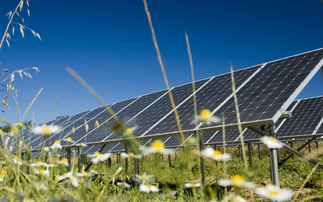Controversial consultation on solar subsidies widely tipped to be published this week
The Department of Energy and Climate Change (DECC) is expected to publish a major consultation on the level of financial support provided to solar farms this week, with government and industry sources indicating it could be released as early as today.
The prospect of a fresh review of solar farm subsidies was first revealed by BusinessGreen late last month, after sources confirmed the government was considering changes to the subsidy regime in an effort to support its new Solar Strategy.
The strategy set a new aspirational target to install over 20GW of solar capacity by 2020, but also detailed how ministers wanted to curb the development of new ground-mounted solar farms and shift the industry's focus towards large-scale rooftop installations.
Consequently, speculation has been mounting across the industry that the new consultation will propose cuts to the level of support available to solar farms, coupled with a potential increase in support for commercial scale rooftop installations.
The speculation has fuelled industry concerns that ministers could impose steep cuts to subsidies that would effectively halt solar farm development in the UK - fears that have not been fully alleviated by ministerial reassurances last week that the government intends to not enact any changes to the current subsidy regime until next April.
BusinessGreen understands a number of solar industry executives will meet with senior DECC officials to discuss the proposed changes later today, while several sources have indicated that the consultation is scheduled to be published this week.
There had been speculation that purdah rules relating to this month's European election would further delay the launch of the review, but BusinessGreen understands that the consultation can be published ahead of the election.
Government sources have argued subsidy cuts are required to stop the recent surge in new solar farm developments eating through DECC's available clean energy budgets, while ministers have also voiced fears that excessive solar farm development could lead to local opposition to new projects similar to that faced by some wind farms.
But the industry has countered that it enjoys the highest level of public support of any energy technology, adding that the frequent changes to solar policies and subsidies is in stark contrast to the incentives being handed to fracking developers.
Alasdair Cameron, energy campaigner at Friends of the Earth, called on the government not to impose excessive subsidy cuts on a sector that is playing an increasingly central role in the UK's decarbonisation efforts.
"Solar is on target to be one of the cheapest, cleanest and most popular forms of energy in the UK, but Government support is essential to ensure it delivers," he said. "Ministers have constantly underestimated solar power, and failed to grasp its potential. Financial support for solar has already fallen, and any further reductions should only be carried out in a planned way as costs drop. But suddenly pulling the rug out from under a popular growing clean energy industry makes no sense, and would put thousands of jobs at risk. Ministers should be looking to support the best large-scale solar projects - that can also boost biodiversity - and do far more to promote local ownership."
Any move by the government to impose swift or steep cuts on solar farms is likely to spark a political row, after both Labour and the Green Party last week criticised the proposed consultation.
Green MP, Caroline Lucas, last week described the government's proposed review as "unjustified and harmful", adding that the coalition "should be doing all that it can to support solar power at all scales - not making it more difficult".
Leonie Greene, of the Solar Trade Association (STA), said the industry was anxious about the changes being planned. "We simply don't know what to expect and that's particularly unnerving for the solar industry because historically it's felt changes have been badly handled," she told BusinessGreen.
She added that the industry was equally concerned that the review would fail to increase tariffs for the mid-scale solar market that is currently failing to achieve its potential and that the new Contract for Difference scheme would fail to help SME installers.
"There are some very serious policy holes for solar which DECC don't seem to understand, so that doesn't inspire confidence," she added.
Greene said she hoped DECC would propose a review that is evidence based and "treats solar in equitable fashion to other renewables".
"If that doesn't happen and solar is deliberately constrained, it will be a major departure from the ethos of letting the market and local communities decide what renewables are delivered," she added.









